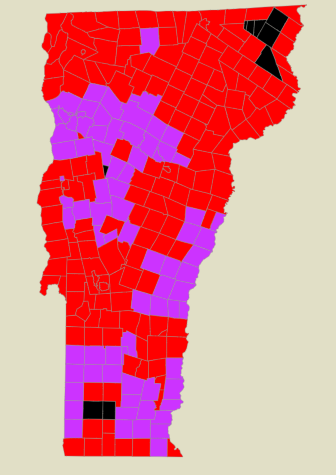In an election in which a socialist third-party candidate won 13,000 votes, Democrat-turned-Republican John Rodgers defeated Progressive/Democrat incumbent David Zuckerman to win the general election for lieutenant governor.
The lieutenant governor race featured two farmers – Rodgers, hemp, and cannabis on his fifth-generation farm in Glover, and also a contractor, and Zuckerman, on the fruit and vegetables farm he bought in Hinesburg – as the two frontrunners. Rodgers won 171,130 votes (46%) compared to Zuckerman’s 165,774 (45%).
Rodgers claimed the lead early and never lost it, although the gap narrowed to less than a percentage point by about 10 PM. Election Night observers watched as ‘blue’ town results such as Middlebury and most Chittenden County towns and cities showed up for Zuckerman, but never with enough of a margin to overcome Rodgers overwhelming support in most of the rest of the state. (See town by town graph).
With Gov. Phil Scott a known lock to beat Democrat Esther Charlestin, the LG race was the most closely scrutinized by Vermont’s political observers. Yet they (including VDC) completely missed the impact of a third-party candidate.
Little-known and less discussed was Ian Diamondstone, the son of longtime Liberty Union candidate Peter Diamondstone, LG candidate for the Green Mountain Peace and Justice Party, whose motto is ‘Non-violent Revolutionary Socialism.” Yet he picked up 13,655 votes, good for 3.68% of the total in an election won by less than half that.
It’s impossible to know how many votes Zuckerman – who, as a progressive, might have been the default choice for the GMPJP faithful – to Diamondstone. If Vermont state elections worked under the ‘ranked choice voting’ system, a Zuckerman victory might have been more likely. It is also possible that the socialist turnout reflects a decades-long rift that goes back to Peter Diamondstone, who told this reporter in 1986 how he felt after hitting a car while driving late at night: “I saw it writhing on the road, and I felt awful, and I thought, that’s exactly how I feel when I think about Bernie Sanders.”

Diamondstone Sr. told me he perceived Bernie as a kind of socialist sellout who did whatever it took to get elected. Zuckerman, a protege of Sanders who was endorsed by him this year, may also be open to that charge for running as a candidate in the two-party system.
Whatever the reasons for or impact of the Diamondstone turnout, Rodgers’ victory was spurred mostly by widespread taxpayer discontent and the opinion that Chittenden County Democrats have been ignoring the housing, transportation, and energy needs of rural Vermonters.
The election of Rodgers will play a role in the makeup of the 2025-25 Senate. As a member of the Senate Committee on Committees, he will be one of three members choosing future committee chairs and membership.
If the rejuvenated GOP caucus ends up supporting a more centrist candidate for Senate Pro Tem, that new leader and Rodgers will be two likely voices for a realignment of Senate leadership and priorities.
